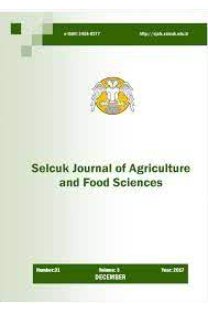Evaluation of some entomopathogenic fungi against the fall webworm (Hyphantria cunea Durry, Lepidoptera: Arctidae)
Evaluation of some entomopathogenic fungi against the fall webworm (Hyphantria cunea Durry, Lepidoptera: Arctidae)
Fall webworm (Hyphantria cunea Durry, Lepidoptera: Arctidae) is an important pest infecting about 600 hosts. It is harmful especially in hazelnut orchards in the Black Sea Region and is becoming epidemic occasionally. It may cause damage in mulberry, cherry, apple, poplar, and willow beside hazelnut in the region. Due to having a polyphagous feeding behavior and a high reproduction power; fall webworm can spread rapidly and make difficult to manage. In the region, currently, mostly chemical control is applied against this pest. Due to adverse effects of the chemical control to the environment and to living organisms, it is inevitable to develop other alternative control methods for this pest. In this study, the effects of some entomopathogenic fungi isolates obtained from Palomena prasina which is another pest in hazelnut production areas, on H. cunea in laboratory conditions. Overall, 1x108 conidia mL-1 of concentration obtained from 2 isolates of Simplicillium lamellicola (TR-01 and TR-02) and 4 isolates of Lecanicillium muscarium (TR-04, TR-05, TR-07 and TR-08) was used against 3rd period larva of the H. cunea. The experiment was conducted with four replications, 10 larvae individuals in each. Mortality of H. cunea were reported daily, over 12 days. At the end of 12th day, among the isolates of entomopathogenic fungi, the TR-05 isolate of the L. muscarium ranked the highest mortality by 93.9% rate. Effect of the other isolates of L. muscarium varied between 72.7% and 90.9%. The TR-01 isolate of the S. lamellicola showed effect of 57.6%, and the TR-02 isolate showed effect of 78.8% mortality. Effects of all the isolates used in the study were differed from the control (P<0.05). Based on LT50 and LT90 values, the most effective isolate was identified as TR-04 (5.64/day and 9.38/day, respectively). It can be concluded that, the isolates of L. muscarium was found quite effective and it could be a promising agent for controlling this pest in the field in the future.
- ISSN: 2458-8377
- Yayın Aralığı: Yılda 3 Sayı
- Başlangıç: 2002
Sayıdaki Diğer Makaleler
Konya Ekolojisinde Bazı Makarnalık Buğday Genotiplerinin Verim ve Kalite Özelliklerinin Belirlenmesi
Küresel İklim Değişikliği ve Hayvancılık
Şanlıurfa Özelinde Yapılan Aspir Çalışmaları
Halil HATİPOĞLU, Abdullah Suat NACAR, Servet ABRAK, Mehtap SARAÇOĞLU, Hüseyin ARSLAN
Operational Characteristics of Black Carrot Harvester with Vibrating Cleaning Elevator
Osman ÖZBEK, Mustafa Nevzat ÖRNEK, Ali Yavuz ŞEFLEK, Nurettin KAYAHAN, Haydar HACISEFEROĞULLARI
Evaluation of Worms as a Source of Protein in Poultry
Irrigation Performance of Ilgın Plain Irrigation Association
